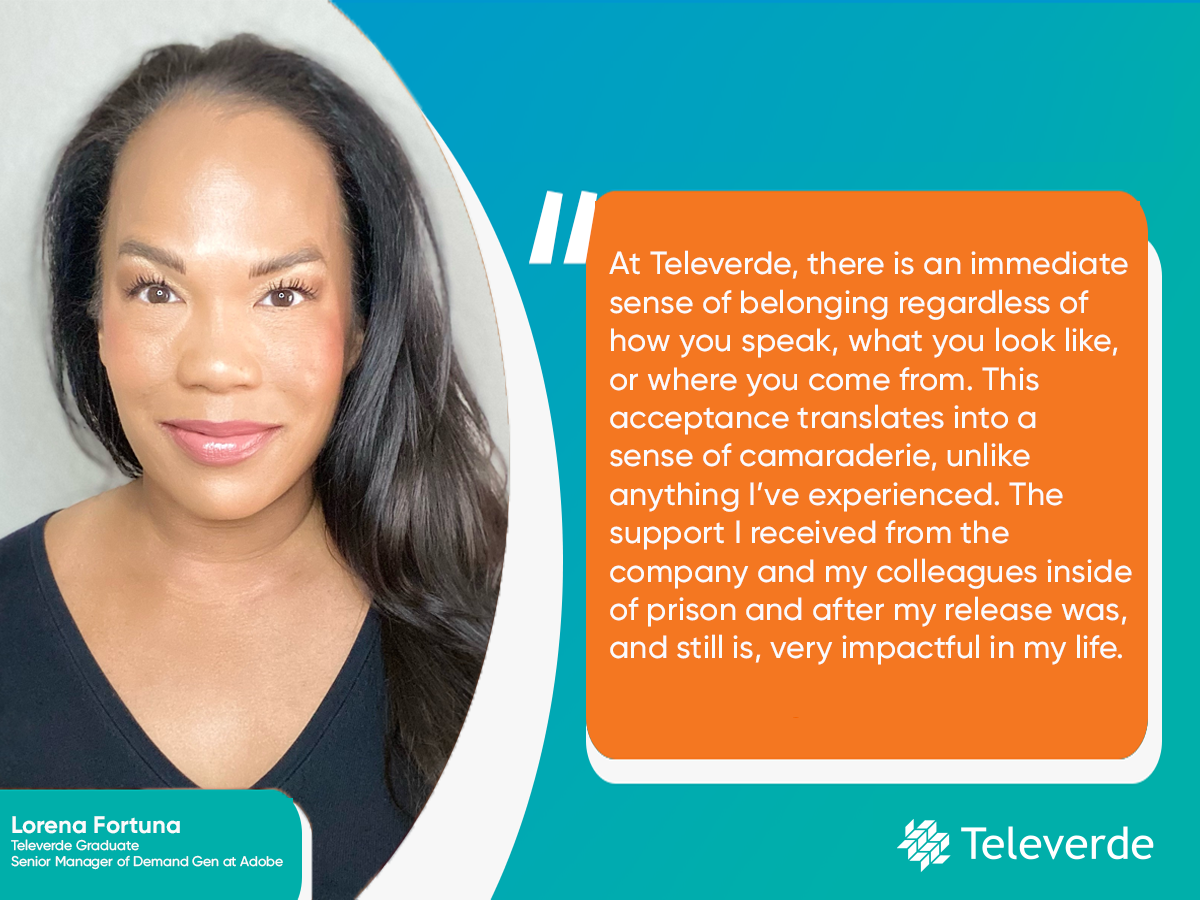I Owe My Career Success to Televerde’s Prison Work Program
An edited version of this article appeared in the Arizona Republic opinion section on Aug. 21, 2022
More than a decade ago, I made a series of terrible decisions that ended in a felony conviction and a six-year prison sentence. When I first entered the Arizona Department of Corrections Perryville, I didn’t allow myself to imagine what my future held. It felt like I had thrown my professional life away. At that time, when I pictured my future after prison, I saw myself struggling to get by working low-wage jobs.
Today, I’m a senior manager of demand generation at Adobe. I’ve built an incredible career in an industry I’m passionate about. And I know that none of that would have been possible had it not been for the job I had while incarcerated. For most of my time at Perryville, I worked for Televerde. It’s a sales and marketing services company and a significant portion of its workforce is comprised of incarcerated women in Arizona.
That last part often draws scrutiny from critics of prison labor. I’ve seen the recent discourse about for-profit companies using prison labor in Arizona. It’s immediately labeled as exploitative without further research or investigation. I say this as someone who acknowledges that changes are needed within the prison system, especially when it comes to prison labor. But I can tell you from firsthand experience that Televerde is a company doing it right and their commitment to uplifting the incarcerated community is both legitimate and effective.
I applied to work for Televerde about three months into my sentence at Perryville. It was the best-paying job available, and I saw it as an opportunity to make money to support myself and establish savings to help me restart my life upon release. It was also the only opportunity available that I felt would allow me to continue to build business skills and on-the-job experience that could lead to a meaningful career after prison.
I was hired as a reporting and systems analyst. I saw the position for exactly what it was: an opportunity to learn, grow, and stay current with technology trends and applications. Perhaps most important, it was a position that gave me a purpose. I don’t know how I would have survived my prison stay if I didn’t have Televerde. I felt like I was contributing to something meaningful and being able to do so in a prison environment made the unpleasantness easier to endure.
The women I worked with were diverse in terms of education, experience, and ethnic background. I was never treated differently because of my race or any other factor not related to my work performance. At Televerde, there is an immediate sense of belonging regardless of how you speak, what you look like, or where you come from. This acceptance translates into a sense of camaraderie, unlike anything I’ve experienced. The support I received from the company and my colleagues inside of prison and after my release was, and still is, very impactful in my life. That’s why I am active with the Televerde Foundation, the non-profit arm of Televerde’s business, as a mentor to fellow graduates. I pay it forward by giving my time and resources to make a difference in the lives of women who come after me. When we are hired, we are uplifted by the company. We are told we are valued and that we are more than our worst mistakes. As we move on through the program and after we graduate, we do the same for the new women coming in.
There is no other prison program that I know of that affords opportunities to women like Televerde. I, along with many of the other women who have graduated from the program, have left with the skills needed to achieve lucrative roles in tech, marketing, sales, and more at industry-leading companies. Many of those opportunities are enabled by the strong relationships the company builds with its clients. And many of Televerde’s clients strongly believe in the company’s second-chances business model. I saw executives from our client organizations express genuine interest in our success, going above and beyond to interact with our teams and then hiring us as we are released.
Working for Televerde wasn’t easy. But building a successful career anywhere isn’t easy. You need to put in the hours: learning, studying, and sacrificing. The effort I put in exposed me to a variety of work experiences. As I learned more, additional opportunities opened for me. I moved on from my analyst role to become a junior client success manager. That was the true turning point that set me on the path to where I am today. I would not have a career in my current field had I not gone to prison.
Televerde has graduated more than 3,500 women from its prison program. The overwhelming majority have gone on to build thriving professional careers in business, something once unthinkable for anyone with a criminal past. Because of Televerde, the unthinkable is now a reality for many incarcerated women in Arizona. The experiences of a handful of women cannot possibly be what defines Televerde’s 27-year model, just as we would never allow a small few to define any company not using prison labor (a quick scan of Glassdoor will show vastly different employee experiences even for the most beloved companies). The most authentic companies continue to evolve and adapt, improving the experience for all their employees. As someone still engaged in the non-profit work of Televerde, I know Televerde to be this type of company, and there are thousands of women who have also been through the company’s program that would back me up.


